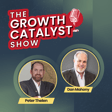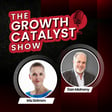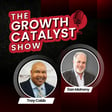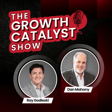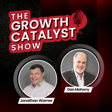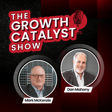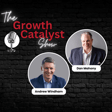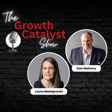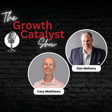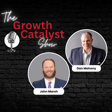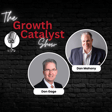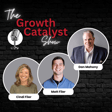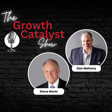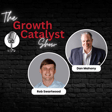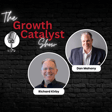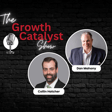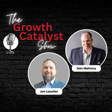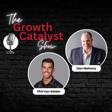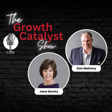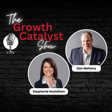Become a Creator today!Start creating today - Share your story with the world!
Start for free
00:00:00
00:00:01

Strategic Growth and Leadership with Katie Wagner
Join us on The Growth Catalyst Show as we explore the inspiring journey of Katie Wagner, President and CEO of KWSM. From her beginnings as a broadcast journalist to leading a successful digital marketing agency, Katie shares how her passion for storytelling and strategic thinking shaped her entrepreneurial journey. Gain actionable insights and stay ahead in the dynamic world of marketing with this engaging conversation.
Transcript
Introduction to the Growth Catalyst Show
00:00:00
Speaker
Welcome to the Growth Catalyst Show, where we believe that growth can come in many forms, professional, personal, company, sales, you name it. I'm your host, Dan Mahoney, founder of Transcendent Sales Solutions and a guide to a world of growth possibilities. I've spent my career empowering companies and their people with strategies that accelerate growth.
00:00:18
Speaker
I'm here to bring you stories of these business leaders and their trusted advisors to gain insights into their journeys and learn how they feel their own growth. Just maybe their journey could become part of your own growth story.
00:00:30
Speaker
Are you ready? Let's grow.
Guest Introduction: Katie Wagner
00:00:34
Speaker
Welcome to the Growth Catalyst Show. I'm your host, Dan Mahoney, and I am so excited to have my next guest here today. Katie Wagner is the president and CEO of KWSM, a digital marketing agency with offices in Orange County, San Diego, Atlanta, and Las Vegas.
00:00:50
Speaker
KWSM specializes in branding, messaging, and ongoing market execution and aims to help clients generate and convert more leads. Katie, welcome to the Growth Catalyst Show. Hi, thanks for having me.
Katie's Journalism Background
00:01:02
Speaker
I'm so glad to have you. We finally made it happen. I know, I know. We've been talking about it forever. And now it's finally, I'm so glad to have you here today and learn more about you and your business.
00:01:12
Speaker
So at Atlanta native, correct? Sure, that's right. I grew up in Atlanta, went to high school there. Westminster, if I did my research, correct? but You know everything, yes. I don't know everything, but I have to do my research. So as you know, as a good journalist, right? As you were started in journalism, I understand you went to Boston University. How was it living up in Boston for college?
00:01:34
Speaker
I loved it. I loved it. So let me tell you how I decided to go to Boston University. So I grew up in Atlanta. I went to high school Westminster. And then I knew I wanted to be in journalism. So I researched a bunch of journalism schools and sent applications to eight of them but never visited a single one.
00:01:50
Speaker
So I got my acceptances back and I didn't have anything to base it on. So I put the names in a hat and drew one and ended up at BU. And I'd never seen it, didn't know anything about it. But it was it was an amazing four years and I'm so glad I went.
00:02:04
Speaker
What made you decide to, what was broadcasting made you decide to do that when
Breakthrough Moment on 9/11
00:02:08
Speaker
you were in high school? Like, I decide I want to be in journalism. You know, i I've always liked storytelling. i think we connect with other people through stories. And i also candidly like to be the one that knows all the information.
00:02:21
Speaker
the So it appealed to me to to sort of be on the forefront of helping disseminate information, helping tell stories and inform other people. um Actually, when I got into it, I started in radio.
00:02:33
Speaker
My first job was at National Public Radio, and then I moved into TV. And my least favorite part of TV was actually being on TV. I really like the journalism and the storytelling, but the the performance aspect was um less exciting to me.
00:02:49
Speaker
what what And you spent over, what, 14, 15 years in broadcast journalism? I did. what was What was some of your proudest moments, achievements in that career? um Well, um my big, big break, if you want to call it that, when I went from local to national news was actually on 9-11.
00:03:07
Speaker
I was working as a reporter in Portland, Maine, at a local ABC affiliate there. And I don't know if you'll remember this, but the terrorists were living in Portland, Maine before they executed their attack.
00:03:20
Speaker
do. And so um on the morning it happened, my job was to track down the girlfriend and the job and the life of one of these terrorists and and how he had been living in Maine. And so I did that and reported on the story and it it got picked up by the network. And that was sort of a a big boost to my career, but such a sad way to have that happen, you know, that that it was such a horrific story, but um but a turning point that I won't forget in my own career. Yeah.
Industry Evolution and Retirement
00:03:47
Speaker
and And then, you know, when I got to the national level, I've i've interviewed four u s presidents, which is exciting. Bush, Bush, Clinton, and Obama. I've been on Air Force One.
00:03:58
Speaker
um There are so many highlights and I loved it. But you know what, Dan? I also loved the... Local consumer reporting I was doing before that and then you know helping people that were scammed and um all of that. So there really wasn't a bad day. I'd still be doing it if if the industry and the world hadn't changed.
00:04:18
Speaker
I was going to ask you about that. I mean, from what I remember about journalism and even back in the early 2000s into 2010 to now, it's really changed. It seems like it's it's more commentary and less journalism.
00:04:32
Speaker
In thinking back, would you think if you were girl coming out of high school, you would have done the same thing Yeah.
00:04:44
Speaker
Yes, I would have. I wouldn't have traded that career for anything, but I think you've hit on something really important that it's my soapbox a little bit. I think this day and age, people can't tell the difference between news and commentary.
00:04:56
Speaker
And I think what most people are watching in the evenings is commentary and they don't realize it. They're taking it as fact when really it's entertainment. And it's not that there's not a kernel of truth there, but it's it's not straight journalism anymore. There is a lot of entertainment factor and a lot of spin.
00:05:12
Speaker
And that that was actually not the case 15 years ago when I was in the news. I retired in 2009, so it's been a little while. um But, you know, I reported um for all of the networks. I was on Fox. I was on CNN. I was on ABC and NBC.
00:05:28
Speaker
And no one ever told me how to spin it or what to say. You know, that just wasn't a factor back then. um But these days, if I'm going to watch the news, I'll, I'll watch local news because I think it's more true to actual journalism or I'll listen to national public radio, which is still near and dear to my heart. But yeah, a lot of, a lot of changes.
00:05:47
Speaker
I get all my news from TikTok now, so I get the facts, right? Well, the next thing you're going to ask me is how did I end up in, in digital
Founding KWSM and Transition to Marketing
00:05:55
Speaker
marketing? And that's exactly why, Dan, because when I was in the tail end of my career,
00:06:00
Speaker
you know In 2005, Facebook came out and people started getting news on Facebook and watching videos on YouTube and seeing headlines on Twitter. And it was really changing that nobody went home to watch the five o'clock news anymore. They could get get all their news on social media.
00:06:16
Speaker
And so I actually saw that as an opportunity. I realized that we weren't going to get that audience back, that we needed to sort of meet them where they were. and so it's actually why I retired in 2009 so that I could be in digital and and help reach people in a new way.
00:06:31
Speaker
So that was the turning point for you because that's a big jump. i mean, it's a big jump to just, hey, I'm just going all a sudden go into marketing and become a marketing firm. yeah it It is and it isn't.
00:06:42
Speaker
So yes, I mean, I completely reinvented my career, right? I'm on my second career now. And i it's funny, I've had the agency 15 years, which is as long as I was in TV. So next year, this one will be longer, which feels weird.
00:06:55
Speaker
um But it's it's the same job in so many ways. At KWSM, we call ourselves brand journalists. um It's not unbiased. We work for our clients, but we're still telling telling stories. We're still trying to figure out what resonates with people on that emotional human level and position and message things that way.
00:07:13
Speaker
And so there is a lot of... There are a lot of transferable skills. And actually, many people on my team are former journalists. And and the skill set really does work. You know, we're used to hitting deadlines. We're used to producing work that resonates. And um those things are very useful.
00:07:31
Speaker
I would love to hear the journey from how you kind of started and where you are today. Because I know you have, just looking on your website, you have a great team, probably have 16, 18 working for you. Yeah. Note to self, update the website. um Yeah, we probably have 42 people pool time now.
00:07:49
Speaker
Okay. Yeah. So ah a few. ah few. It's one. And that's across our four offices. So they're spread out. Yeah. Yeah, you know, when I started the agency, I really thought it was just going to be me in my yoga pants in my spare bedroom, you know on my laptop helping people.
00:08:06
Speaker
And I thought I would be a consultant. I didn't know I was building an agency. And that's that was the goal. And then as we started helping companies and we needed to do more and take on more people,
00:08:17
Speaker
um it just sort of grew and took on a life of its own and now it's a very different company um i think you know this because we've known each other a long time when i started the company i'm not proud to tell you i called it katie wagner social media because i um it was just me i thought i would do social media for people and back then even business pages on social media didn't exist we were running people's personal facebook pages um And everybody told me that's not a real job. Digital is going to go away. And I still took a chance.
00:08:49
Speaker
And then over the years, we became a full service agency. We added website design. We added ah video and photography. And we really built out our lead generation tools. And in 2018, we rebranded and took my name off the company and called it KWSM, which today we tell people stands for Know Why Stories Matter.
00:09:09
Speaker
um So that's our development. sort of retrofitted Genesis story. but um But I think that's really when we became the company we are now, when when it wasn't about me, it wasn't about social media. It was really about the team and how we help people ah collectively.
00:09:26
Speaker
And that's that's probably what I'm proudest of is that it's, you know, if I get hit by a bus tomorrow, everybody still has jobs. They know what to do and it may take them a few days to realize I'm gone. So that that to me is a win.
Strategic Sabbaticals
00:09:39
Speaker
One of the things that I've always been, there's so many things I've been impressed with you about the work and the work you do for clients, but the time you put in yourself to working on the business. And I know sometimes it's hard to get ahold of you at certain times of the year because you're out of the office on business planning. And I think you referred to it as your business, your, your kind of planning sabbatical, correct?
00:10:05
Speaker
Yeah, yeah, strategic planning. um So I step away for two months every year, January and July, um to work on the business instead of in it. And during that time, i have no contact with my office and my staff is not allowed to reach me and neither are our clients.
00:10:22
Speaker
And it serves a few purposes. i mean, number one, it's a good reset for me. It allows me to really go deep into what we're doing and um solve some problems that I maybe don't have time to focus on when I'm in the day-to-day and really set the stage for who are we going to be as an agency for the next six months.
00:10:40
Speaker
And I think that provides a lot of stability for my staff and makes sure that we continue to grow and stay solid as a company. But the other benefit, Dan, is that it allows my leadership team to run the business without me.
00:10:53
Speaker
And they really step up to lead. And the reason I'm not gone for like two weeks is is very intentional. It's because you can wait on me for two weeks, right? That a decision needs to be made and they'll say, well, let's just wait and see what Katie has to say.
00:11:07
Speaker
They can't wait for four weeks. And so they have to make decisions and move things forward. And that has made us so much stronger as a company because I have a leadership team who is not waiting on me to approve every decision. They know what to do. They run their teams the way they know is right. and And I think we're a better company for it. And we do better work for our clients for it.
00:11:28
Speaker
I don't know many business owners that will take that much time to do that. And I think that's just amazing. Thank you. Thank you. it's ah It was a little stressful at first, right? and i And I miss it. you know being I'm not at the beach every day. I'm working on bigger picture initiatives.
00:11:45
Speaker
But by the time four weeks passes, I miss my staff. I miss my clients. I can't wait to get back in the office, which is is great. Do you follow kind of a structured kind of like, okay, because you've done this for several years, correct? Yeah.
Advice for Entrepreneurs
00:11:59
Speaker
15 years. Yeah. So you've done this for 15 years. You've done this. So do you kind of follow the structured kind of process? Like, okay, this is what I'm going to do. Or does it just kind of come to you? I'm i'm curious.
00:12:10
Speaker
A little of both. So during the six months I'm working in between, i have a file on my computer that I call vision. And anytime an idea comes to me like, oh, I should go deeper into that rabbit hole, or I should look into this aspect of the business or something I want to do, I tuck it into that folder.
00:12:26
Speaker
And my staff will also send me ideas. If there's something they want me to consider, they title the email vision goes straight into the folder. So when I go out on my strategic planning, Candidly, the first couple of days I sleep and walk my dog and go to the gym and and rest.
00:12:41
Speaker
And then when it's time to get back to work, I open this folder and I go through everything in it, which is hundreds of emails typically. And I make a list of the things I want to address during that period.
00:12:53
Speaker
And i you know I make a list and I write it all down. And then I start to put together a schedule. And I say, okay, these things go together. i'mnna handle these in week one. And then these things go together. This is week two.
00:13:04
Speaker
And then sometimes I'll ask my leadership team to weigh in on something and have their responses back to me just via email by week three. And then I can focus on something they've taught me.
00:13:15
Speaker
I always read at least two business books during that time. So every morning starts with quiet time and reading business books and reflecting and getting inspired. And I found that the way I work best is just by being quiet and making space and time for the ideas to come.
00:13:31
Speaker
And I have my best ideas about how to run the business that way. And it it improves my leadership and my vision for the future. So so there's ah a loose structure, but it's also just a lot of sitting and thinking.
00:13:44
Speaker
I love that. i love that, how you how you do that. You've done it since the beginning. Yeah. so yeah So someone's out there thinking about starting a business or improving their business, and you, as a successful entrepreneur, talk and give some of some perspective on and some things they should think about.
00:14:02
Speaker
Hmm. Well, people always ask me if I would do it again. And the answer is, I don't know. It is, it has been much harder than I thought it would be to grow a company. Um, and more rewarding. I say that it's the biggest self-development thing I've ever done.
00:14:17
Speaker
Like I have had to improve myself as a human to be the leader of this company. um So that's definitely been worth it. um But I think it's really important if you're going to undertake this to to know where you're trying to go. What is the vision? You know, what does success look like for you?
00:14:34
Speaker
Because it's so easy to get waylaid by every new idea or new opportunity or even every setback can knock you off course. And so really keeping that North Star vision and that that knowledge of where you want to get to, I think, is helpful.
00:14:49
Speaker
um And then, you know, the opposite of that is also knowing that the environment will change, that, you know, customers don't act the way they do now forever. Employees don't act the way they do now forever. the geopolitical climate is in flux.
00:15:03
Speaker
And all of those things will affect the decisions you make and the way you run a business. So it's it's keeping your sights on the long term while being flexible in the short term. And, um... That's the advice I give most people. And then the the only other thing I usually say is um remember that you'll not have a boss.
00:15:22
Speaker
And so there is no one to tell you you're doing a good job and you're going to have to be okay with that. Because you know there are a lot of moments of doubt and there's a lot of imposter syndrome and and not knowing what the right answer is.
00:15:35
Speaker
And so one of the things that's been really valuable for me is to surround myself with um other professionals and business leaders like yourself who I can bounce ideas off of and I can confide in because you can't go to your staff and tell them you're having a bad day or you don't know the answer.
00:15:53
Speaker
You have to have other people in your life who can validate you and listen to you and hold space for those things. um And also can celebrate your wins. Because again, i don't I don't have a performance review. Nobody tells me I'm doing a good job. And it can be hard to stay motivated when you're not getting that feedback. So um you have to you have to set that up for yourself to have success.
00:16:13
Speaker
It's lonely at the top, isn't it? that It is. But I was either naive or egotistical enough to not think of that part when I started it. Right. But, but you're right though, setting up, you know, having a close circle of individuals you can call on almost like an, uh, and I know some business owners do it, an advisory board, um, and company, you know, organizations like Vistage and where you can walk in the room and it's important to have that for that success.
00:16:39
Speaker
Absolutely. and And I've been a Vistage member for 10 years, and that has kept me going. It's pushed me to grow. helped me solve a lot of problems. um But yeah, and and also just friends. you know I have a close group of um women agency owners who I spend time with, and we can bounce ideas off of. And it's it's amazing. No matter where you are in your business journey or what industry you're in, a lot of the problems are universal. So having those other business owners you can lean on is really... um really helpful as you move forward.
00:17:11
Speaker
Before we get into a little more about KWSM, what do you like to do when you're not working?
Katie's Personal Interests
00:17:17
Speaker
What's fun look like for you? Hobbies, interests? Yeah. um so I have a plethora of them.
00:17:24
Speaker
So I like to hike and work out and do a lot of outdoors things. Um, I am a writer, so I i write books in my spare time. I'm working on a memoir, and I'm getting my MFA currently, which is Master of Fine Arts.
00:17:38
Speaker
um So hoping to go to publication some point in the next year. um And then I think you know that i have a heart for senior dogs and I work um volunteer at a senior dog rescue. And so my husband and I adopt dogs who are 10 and older and see them through to the end of their lives, which is um very, very difficult, but very rewarding. and And I think gives me a lot of purpose. So a lot of my weekends are taken up doing things with the dogs. You know, we load them in the car and take them to the beach or play with them in the yard or that sort of thing.
00:18:12
Speaker
And how many do you usually keep at one time? About six. Six is our our sweet spot. Okay. All right. like I have one. That's a lot of work. I know. But keep in mind, these are senior dogs. Yeah, right. They're like a wound around.
00:18:26
Speaker
Yeah. They're not running around. They're just kind of trotting around, right? Yeah. Yeah. They're moseying.
KWSM's Clientele
00:18:32
Speaker
So let's let's transition and talk a little bit about KWSM.
00:18:38
Speaker
What does your typical client look like? And I know, it's it's and i and I didn't realize this, you do as much B2B as you do B2C with your agency as well, which I didn't know that.
00:18:50
Speaker
Let's take a moment for a quick word from our sponsor. This episode of the Growth Catalyst Show was brought to you by Transcendent Sales Solutions. Whether your company is facing uncertainty, declining sales, or resource limitations, Transcendent Sales has the solution.
00:19:04
Speaker
Their team has decades of experience helping businesses find alignment to meet their growth goals and transforming underperforming sales organizations into revenue-producing market leaders. They take a hands-on, results-oriented approach to solving sales challenges.
00:19:18
Speaker
Visit TranscendentSales.com to learn more and subscribe to the bi-weekly Growth Catalyst newsletter for insightful growth strategies. Transcendent Sales Solutions, empowering businesses to reach new heights.
00:19:30
Speaker
And now, back to the show. Yeah, we're probably slightly more B2B these days, maybe 60, 40. um But we will do both, which a lot of agencies won't. um So we like both sides of that equation.
00:19:43
Speaker
And our typical clients are sort of in the lower middle market space. So you know it's a broad space, one to 100 million, and most of them are probably in the five to 30 million space. Mm-hmm.
00:19:54
Speaker
They do anything and everything. We are typically industry agnostic, but there are spaces we play in frequently. One of them is manufacturers work a lot with companies that that make things.
00:20:07
Speaker
um Professional services, so law firms, wealth advisors, CPAs, those type firms. um We have a lot of nonprofit clients. About 20% of our clients are nonprofit at any given time.
00:20:18
Speaker
And then we also work with a lot of direct-to-consumer companies, but not as many e product e-commerce product companies, more um service-based companies that are direct-to-consumer, like gyms or restaurants or banks, those type of things.
00:20:33
Speaker
So it's ah it's a wide range, and that's really intentional. um Because in we specialize in lead generation.
Lead Generation Strategies
00:20:40
Speaker
And in lead gen, what worked last week isn't going to work next week. It changes so frequently that I think it makes us better at our jobs that we can figure out something in one industry and sort of pull it across to another and test ideas.
00:20:54
Speaker
I think we're more innovative because we work in a variety of industries. Well, and lead generation is one of the things I want to talk to you about because it did it does change. And I think about how I used to, i mean, most of a lot of business comes from referrals, and but you only, those only take you so long.
00:21:10
Speaker
And in some business, it's not applicable. How do you, keeping up with technology now, especially with AI, with lead gen, I mean, if you're a business owner, like, all right, where do you even start at this point? Because like you said, what worked yesterday doesn't necessarily work today.
00:21:26
Speaker
I mean, it's true. And so, you know, also AI has made lead gen actually more difficult because what it's done is flood the internet with a bunch of content, some of it better than others. so And it's a much more crowded space, number one. And number two, trust in the internet is lower than it ever has been.
00:21:45
Speaker
That's partially because of all the content out there, but it's partially because of our geopolitical climate, you know, a bunch of things. And so I would tell you lead gen is harder today than it ever has been in my 15 years in business.
00:21:58
Speaker
And at KWSM, we've found that success really relies on a combination of tactics. So if you think about traditional inbound marketing, which is a good place to start, so that's SEO and creating content like blogs and driving traffic back to the website, and then really focusing on whether the website can convert, right? How many of those people are filling out the form or calling you?
00:22:19
Speaker
That's inbound marketing. That's typically been the backbone or the cornerstone of lead gen, but it is harder because there's more content out there. So we like to combine that with something that's probably more familiar to you and your sales work, which is outbound lead gen, which is cold outreach.
00:22:37
Speaker
So through emails, through targeted ads, you know banner ads, display ads, um account-based marketing, where we're helping our clients go after specific companies, and creating content for those people and then reaching out directly um so we we combine that and then what i think the future of lead generation is is something called nearbound marketing or nearbound lead gen and that's really strategic partnerships um so a good example is what you and i are doing right now so we are strategic partners we know each other in a business sense we're creating this
00:23:10
Speaker
podcast, this content together, and you're going to send it out to your audience and I'm going to send it out to my audience. And your audience already has trust with you. They've known you, they're consuming your content.
00:23:22
Speaker
And that trust, Dan, gets um transferred to me. And suddenly I'm introduced to your audience in a warmer way. And so building those strategic partnerships through co-creation of content or co-marketing initiatives can really improve the results of those other types of lead gen you're doing.
00:23:41
Speaker
um Because we we do, we sort of use adjacent businesses to help build our trust and our credibility with their warm audiences already. So a lot of our work these days is building and leveraging those partnerships for our clients.
Understanding Nearbound Marketing
00:23:55
Speaker
I love that you brought that up because I had i had looked and ah highlighted nearbound marketing. i have to ask Katie what that is. it's that's That's great. and and And I think one of the things that I see people, now that I know what nearbound marketing is, they use it in the wrong way. Like I think of an example of somebody that'll go to a, ah say they'll go to a trade show or they'll go to an event and they talk to 25 people, and the next thing they know, they go on LinkedIn with pictures and they tag 25 people.
00:24:27
Speaker
That's not, and I don't think that's the way you want to set your reputation up. No, I'm not a big fan of that tactic either. It happens to them a lot, as I know it does to you. Yeah.
00:24:38
Speaker
But no, just sucking people into your promotion isn't what we're talking about here. Yeah. well but What we're talking about is really creating valuable content together and forming partnerships where it makes sense. you know You're in sales, I'm in marketing, we're were a match made in heaven, but I'm not going to you know go do this with a restaurant who has nothing to do with what I do. right And so it's really looking at who are the partners that could also serve your client base and add value. you know What adjacent services increase the
00:25:11
Speaker
effectiveness of your services, looking for those type of of um partners and really forming those relationships. And, you know, sometimes nearbound marketing is as easy as leveraging the experiences of your clients.
00:25:25
Speaker
You know, testimonials, case studies, user-generated content, all of that can also be nearbound because it's it's the reason reviews are popular, right? Because if I um give you a testimonial to somebody else, I say, oh, I worked with Dan and he was amazing.
00:25:40
Speaker
Well, the person I'm telling trusts me. And so automatically you're a warmer lead for them, right? So um that's also near bound, leveraging those existing relationships and that um that trust that you already have.
00:25:53
Speaker
so Talking about
AI in Marketing and Business
00:25:56
Speaker
AI, where do you, I mean, again, none of us have a crystal ball on AI, but how much harder is it making your industry in the marketing side to to do good work.
00:26:07
Speaker
Because everybody now, I think, thinks are people that never knew anything about marketing are all this sudden are marketeers because ChatGPT came out. Yeah, there's a very low barrier to entry. um So I'm not against AI. I'm a Gemini girl, not ChatGPT, but I'm not against ai I think it's a tremendous tool. I think it's going to be important in the future.
00:26:28
Speaker
But there are sort of three levels of how you use AI. One of them is level one, using it like Google. You ask a question, it gives you an answer. right? A lot of people are using it that way. They just use it as a search engine.
00:26:41
Speaker
Level two is this like leverage to create content, which we're seeing the most of, you know, can it write my blog? Can it make a picture that I'm going to use on my website? And I think that's fine.
00:26:53
Speaker
But as more people just lean into that, the power of what anyone is creating is diluted because there's more stuff out there. Not all of it is accurate. Not all of it is quality. And And I think the high quality content that is out there sort of gets pushed around and and more um harder to spot, right? because it's just such a crowded space.
00:27:14
Speaker
But the way I really think um AI is valuable for the future is using it as a a thought partner. Um, so I actually solve a lot of problems and do a lot of strategic thinking with AI because, you know, as we talked about, I don't have another, another person in the business I can talk to about my problems. I'm supposed to be as the CEO, the one with the answers.
00:27:36
Speaker
And so I'll use, um, Gemini as that. And I'll say, okay, here's the problem I'm trying to face. You are an expert in this space. You know, ask me some questions and then give me some ideas.
00:27:49
Speaker
And you can teach it to interview you just like a good journalist would. And you give it prompts or you give it responses. And then it will come up with ideas to suggest to you. And I have solved many, many problems that way. um and And it just opens up a new space for your thinking.
00:28:06
Speaker
You know, I also sometimes I have long drives because I commute between my offices. And sometimes I'll turn on the um the voice activated part and I'll say, OK, my Gemini's name is Mark. um Because we talk a lot. And I said, what should I call you? And he said, I think you should call me Mark. And I'm all right.
00:28:22
Speaker
So I id say to Mark, Mark, I'm just going to verbally try to solve this problem and talk through things. I don't want you to respond, but I want you to take notes on everything I'm saying. And at the end, i'm going to tell you I'm finished. And I want you to organize my notes and do an outline. Send it back to me with some suggestions based on what you heard.
00:28:39
Speaker
And he says, okay, got it. And then for a 30-minute car ride, I'll just be like, or what if we did this? Do we need to raise prices on that? Or what if we structured it this way? And I'll just talk to myself out loud. Just thinking out loud. Just thinking out yeah. Yeah, and it's creating that white space for yourself to be able to have those outside-the-box thoughts.
00:28:56
Speaker
And my Gemini categorizes it all, sends it back to me in a way that makes sense, and then says, here's what I heard you say. You should think about these three things. And Dan, that's been life-changing for me to just have that thought partner. So I think there are a lot of ways we can we can make it work for us and streamline our business.
00:29:16
Speaker
I don't think writing your blogs is the default or or the first place you should go necessarily. Great perspective. Yeah, that just using it in a different way versus to create, but to almost challenge in some respects.
00:29:29
Speaker
Yes, yes. To push back. And you know the great thing about ai is you know you have a smart friend who's read some books and has some ideas. AI has access to all the information out there at once.
00:29:42
Speaker
And so you know I told you I have these senior dogs. I recently took blood work from one of my dogs who was having some problems and uploaded it into my Gemini and said, I want you to be a world-renowned veterinary specialist.
00:29:55
Speaker
Here is the blood work. Ask me questions, and then let's figure out what to do to treat this dog. And so it digested the blood work and it said, okay, tell me about the dog's age. Tell me about the symptoms you're seeing. tell You know, it asked me questions. I gave it to him.
00:30:09
Speaker
And it said, all right, based on my knowledge, here's what I think is going on with the dog and the treatment plan. Three days later, I saw a specialist who gave me the exact same advice. And so I'm a believer because it has access to a lot more information than you or I have.
00:30:23
Speaker
Yeah. I had heard like a year ago that medical diagnosis when they played with one of the AI tools was like 83% accuracy rate, and that was 12 months ago. so And it's you know it's getting better leaps and bounds, right? So I think there's a lot of exciting things coming, but but again, and creating content is is low on the totem pole for me.
00:30:45
Speaker
This has been a great conversation, Katie. I always enjoy talking to you I've learned so much and I hope everyone else, i think everyone else is going to learn a lot from your perspective.
Contact Information and Further Engagement
00:30:54
Speaker
My last question for you is if somebody wants to get in touch with you and lauren learn more about KWSM, what's the best way to do that? um I'm really active on LinkedIn, Katie Wagner. I'm wearing a red dress in the picture. You can find me there or our web website, which is kwsmdigital.com.
00:31:12
Speaker
Katie, thank you so much for taking time to be on the Growth Catalyst Show. We really appreciate it. Thanks for having me. This was fun. And that's a wrap for today's episode of the Growth Catalyst Show. Remember, you can take these stories of growth and make them part of your own journey.
00:31:25
Speaker
Learn from them, draw inspiration, and let them guide your path of growth. I'm your host, Dan Mahoney, and I look forward to our next journey together. If you've enjoyed the show, please subscribe and leave a review.
00:31:36
Speaker
Until next time, keep growing.
